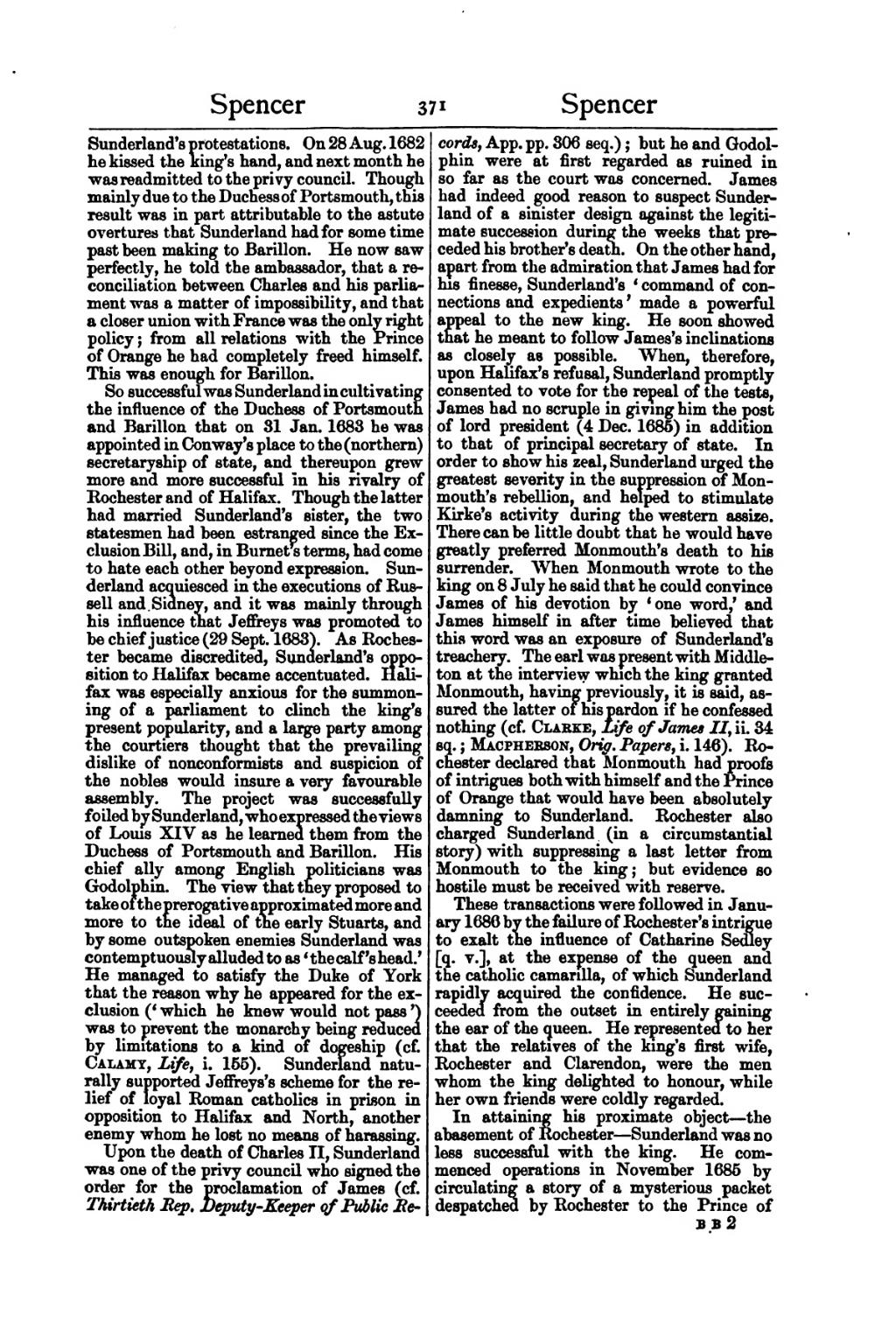Sunderland's protestations. On 28 Aug. 1682 he kissed the king's hand, and next month he was readmitted to the privy council. Though mainly due to the Duchess of Portsmouth, this result was in part attributable to the astute overtures that Sunderland had for some time past been making to Barillon. He now saw perfectly, he told the ambassador, that a reconciliation between Charles and his parliament was a matter of impossibility, and that a closer union with France was the only right policy; from all relations with the Prince of Orange he had completely freed himself. This was enough for Barillon.
So successful was Sunderland in cultivating the influence of the Duchess of Portsmouth and Barillon that on 31 Jan. 1683 he was appointed in Conway's place to the (northern) secretaryship of state, and thereupon grew more and more successful in his rivalry of Rochester and of Halifax. Though the latter had married Sunderland's sister, the two statesmen had been estranged since the Exclusion Bill, and, in Burnet's terms, had come to hate each other beyond expression. Sunderland acquiesced in the executions of Russell and Sidney, and it was mainly through his influence that Jeffreys was promoted to be chief justice (29 Sept. 1683). As Rochester became discredited, Sunderland's opposition to Halifax became accentuated. Halifax was especially anxious for the summoning of a parliament to clinch the king's present popularity, and a large party among the courtiers thought that the prevailing dislike of nonconformists and suspicion of the nobles would insure a very favourable assembly. The project was successfully foiled by Sunderland, who expressed the views of Louis XIV as he learned them from the Duchess of Portsmouth and Barillon. His chief ally among English politicians was Godolphin. The view that they proposed to take of the prerogative approximated more and more to the ideal of the early Stuarts, and by some outspoken enemies Sunderland was contemptuously alluded to as ‘the calf's head.’ He managed to satisfy the Duke of York that the reason why he appeared for the exclusion (‘which he knew would not pass’) was to prevent the monarchy being reduced by limitations to a kind of dogeship (cf. Calamy, Life, i. 155). Sunderland naturally supported Jeffreys's scheme for the relief of loyal Roman catholics in prison in opposition to Halifax and North, another enemy whom he lost no means of harassing.
Upon the death of Charles II, Sunderland was one of the privy council who signed the order for the proclamation of James (cf. Thirtieth Rep. Deputy-Keeper of Public Records, App. pp. 306 seq.); but he and Godolphin were at first regarded as ruined in so far as the court was concerned. James had indeed good reason to suspect Sunderland of a sinister design against the legitimate succession during the weeks that preceded his brother's death. On the other hand, apart from the admiration that James had for his finesse, Sunderland's ‘command of connections and expedients’ made a powerful appeal to the new king. He soon showed that he meant to follow James's inclinations as closely as possible. When, therefore, upon Halifax's refusal, Sunderland promptly consented to vote for the repeal of the tests, James had no scruple in giving him the post of lord president (4 Dec. 1685) in addition to that of principal secretary of state. In order to show his zeal, Sunderland urged the greatest severity in the suppression of Monmouth's rebellion, and helped to stimulate Kirke's activity during the western assize. There can be little doubt that he would have greatly preferred Monmouth's death to his surrender. When Monmouth wrote to the king on 8 July he said that he could convince James of his devotion by ‘one word,’ and James himself in after time believed that this word was an exposure of Sunderland's treachery. The earl was present with Middleton at the interview which the king granted Monmouth, having previously, it is said, assured the latter of his pardon if he confessed nothing (cf. Clarke, Life of James II, ii. 34 sq.; Macpherson, Orig. Papers, i. 146). Rochester declared that Monmouth had proofs of intrigues both with himself and the Prince of Orange that would have been absolutely damning to Sunderland. Rochester also charged Sunderland (in a circumstantial story) with suppressing a last letter from Monmouth to the king; but evidence so hostile must be received with reserve.
These transactions were followed in January 1686 by the failure of Rochester's intrigue to exalt the influence of Catharine Sedley [q. v.], at the expense of the queen and the catholic camarilla, of which Sunderland rapidly acquired the confidence. He succeeded from the outset in entirely gaining the ear of the queen. He represented to her that the relatives of the king's first wife, Rochester and Clarendon, were the men whom the king delighted to honour, while her own friends were coldly regarded.
In attaining his proximate object—the abasement of Rochester—Sunderland was no less successful with the king. He commenced operations in November 1685 by circulating a story of a mysterious packet despatched by Rochester to the Prince of
